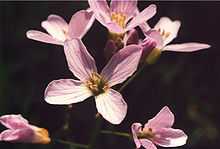Cardamine pratensis
| Cardamine pratensis | |
|---|---|
 | |
| Scientific classification | |
| Kingdom: | Plantae |
| (unranked): | Angiosperms |
| (unranked): | Eudicots |
| (unranked): | Rosids |
| Order: | Brassicales |
| Family: | Brassicaceae |
| Genus: | Cardamine |
| Species: | C. pratensis |
| Binomial name | |
| Cardamine pratensis L. | |
Cardamine pratensis (cuckooflower or lady's smock), is a flowering plant in the family Brassicaceae, native throughout most of Europe and Western Asia. The specific name pratensis is Latin for "meadow."
Description
Cardamine pratensis is a herbaceous, hairless,[1] perennial plant growing to 40–60 cm tall, with pinnate leaves 5–12 cm long with 3-15 leaflets, each leaflet about 1 cm long. The flowers are produced on a spike 10–30 cm long, each flower 1–2 cm diameter with four pale pink (rarely white) petals. The style of the fruit is short or longish.[1] It grows best close to water.
Distribution
Common throughout the British Isles.[2]
Recorded in Ireland from all 40 of the "vice-counties", (a system adopted by Praeger (1901)).[3]
Cultivation
It is grown as an ornamental plant in gardens, and has become naturalised in North America as a result of cultivation. In some European countries, including parts of Germany, the plant is now under threat.
It is a food plant for the orange tip butterfly (Anthocharis cardamines) and makes a valuable addition to any garden which aims at attracting wildlife. It was once used as a substitute for watercress.
Folklore
In folklore it was said to be sacred to the fairies, and so was unlucky if brought indoors. It was not included in May Day garlands for the same reason.[4]
Gallery
-
Cardamine pratensis growing in Wiltshire, UK
-

Details of flowers
-
Buds of a Cardamine pratensis
-

Flowers
-

Plants
Notes
- ↑ 1.0 1.1 Webb, D.A., Parnell, J. and Doogue, D. An Irish Flora 1996. Dundalgan Press, Dundalk. ISBN 0-85221-131-7
- ↑ Clapham, A.R., Tutin, T.G. and Warburg, E.F. 1968. Excursion Flora of the British Isles. Cambridge University Press. ISBN 0-521-04656-4
- ↑ Scannell, M.J.P and Synnott, D.M. 1972. Census Catalogue of the Flora of Ireland. Dublin
- ↑ Howard, Michael. Traditional Folk Remedies, (Century, 1987); p
References
- Blanchan, Neltje (2002). Wild Flowers: An Aid to Knowledge of our Wild Flowers and their Insect Visitors. Project Gutenberg Literary Archive Foundation.
Further illustrations
Scott, R.2004. Wild Belfast on safari in the city. The Blackstaff Press, Belfast. ISBN0-85640-762-3. Photograph p. 45.

